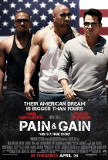Pain & Gain (United States, 2013)
April 25, 2013
With a title like Pain & Gain and Michael Bay at the helm, this review looked like a great opportunity for a vitriolic screed, but that's not going to happen. Defying expectations, Pain & Gain not only represents one of the best movies Bay has made (only the second, following The Rock, to which I have given a positive rating) but one of the standouts of the first four anemic months of 2013. This isn't great cinema, but it's vastly entertaining in an overblown, in-your-face sort of way. It's funny as hell at times with a twisted sense of humor that one typically expects from the likes of the Coen Brothers and Quentin Tarantino.
The events chronicled in Pain & Gain are based on real-life occurrences from the mid-1990s in Dade County, Florida. Bay, along with handpicked screenwriters Christopher Markus and Stephen McFeely, has taken the basic facts as related in Pete Collins' newspaper articles and tweaked them to transform the truth-is-stranger-than-fiction reality into the framework for a dark comedy. There are undoubtedly some who will be offended (perhaps mortally so) by this fusion of high-energy filmmaking with laugh-inducing elements and the Grand Guignol, but it works on its own terms. It's a pleasant change-of-pace to encounter a Michael Bay movie that doesn't feature silly robots, endless CGI, and a teenage mentality.
Pain & Gain focuses on three bodybuilders who concoct a plan by which they can achieve their slice of the American dream by taking it away from someone else. The ringleader, Daniel Lugo (Mark Wahlberg), is obsessed with the idea that he's a "do-er" rather than a "don’t-er." His cohorts are Paul Doyle (Dwayne Johnson), a Christian with a penchant for backsliding, and Adrian Doorbal (Anthony Mackie), a muscle-bound bruiser whose abuse of steroids have left him with an ED problem. Their target is businessman Victor Kershaw (Tony Shalhoub), who uses Lugo as his personal trainer at a gym. After a few misfires, the trio achieves their goal. They hold Lugo hostage and torture him for about a month. After he signs over all his property to Lugo, they kill him - or try to. The problem is, despite crashing his car, blowing it up, and running him over, they can't get the job done. But the police find his story so implausible that they fail to investigate. Meanwhile, Lugo, Doyle, and Doorbal live high off the hog until the funds dry up and the potential of a repeat scheme gains appeal.
Bay generates comedy from some unusual set-ups. The kidnapping misfires are hilarious, effectively illustrating how incompetent the criminals are. The scene in which Kershaw is crunched, lit on fire, and run over (twice) is as funny as any such scene can be. Later in the film, Doyle and Doorbal return a chainsaw to Home Depot when it fails to work after getting tangled in a woman's hair. And there's a memorable sequence where Doyle gets a few helping hands for a barbeque. Some of this material recalls the warped sense of humor embraced by the Coens (think the woodchipper in Fargo) and Tarantino ("The Bonnie Situation" in Pulp Fiction), among others.
Pain & Gain makes no attempt to provide a portrait of the lead trio that is in any way sympathetic. Lugo, Doyle, and Doorbal are class-A idiots with delusions of grandeur. Their justifications for their actions are absurd. Bay emphasizes this by having each of them provide a voiceover narration during different segments and the things they think are as deranged as one might expect given their personalities. Mark Wahlberg plays Lugo as a violent cousin to his character in Boogie Nights: dumb as post, obsessed with his physicality, and attributing a false sense of importance to himself. The most interesting performance is given by Dwayne Johnson (a.k.a. The Rock) who continues to evolve as an actor. Here, he plays a multifaceted character and shows that he can handle comedy, drama, and action equally well. What I wrote in my review of Snitch continues to be valid: "It's nice to acknowledge that The Rock can act - he's got some thespian talent to go along with the brawn and one-liners."
Stylistically, Pain & Gain employs many of Bay's trademark flourishes, although the frequent use of slow-motion seems to be a satirical comment on how ubiquitous this approach has become in key moments during testosterone-fueled movies. The level of lighting is punched up so even scenes taking place in supposedly dim locales are easy to see. There aren't many explosions - Bay's penchant for "blowing things up real good" has been neutered here.
I suppose Pain & Gain could be seen as a dark commentary on the American dream and the way in which Bay composes certain shots (such as one with Lugo in the foreground and an American flag in the background) lends credence to that, but that's about as deep as the movie gets. Perhaps the most noteworthy aspect of Pain & Gain is that it illustrates how Bay, given a budget that's less than obscene and a passion for the project, has the talent and capacity to make something a thinking adult might enjoy. This one won't make a fraction of what his soulless Transformers abominations generated but it's better in almost every way imaginable. I look forward to the day when Bay turns his back on the fat paychecks and infantile screenplays and begins doing more of these kinds of films.
Pain & Gain (United States, 2013)
Cast: Mark Wahlberg, Dwayne Johnson, Anthony Mackie, Tony Shalhoub, Rob Corddry, Ed Harris, Rebel Wilson, Bar Paly
Screenplay: Christopher Markus & Stephen McFeely, based on the magazine articles by Pete Collins
Cinematography: Ben Seresin
Music: Steve Jablonsky
U.S. Distributor: Paramount Pictures
U.S. Release Date: 2013-04-26
MPAA Rating: "R" (Violence, Profanity,Sexual Content, Nudity, Drugs)
Genre: COMEDY/THRILLER
Subtitles: none
Theatrical Aspect Ratio: 2.35:1

Comments